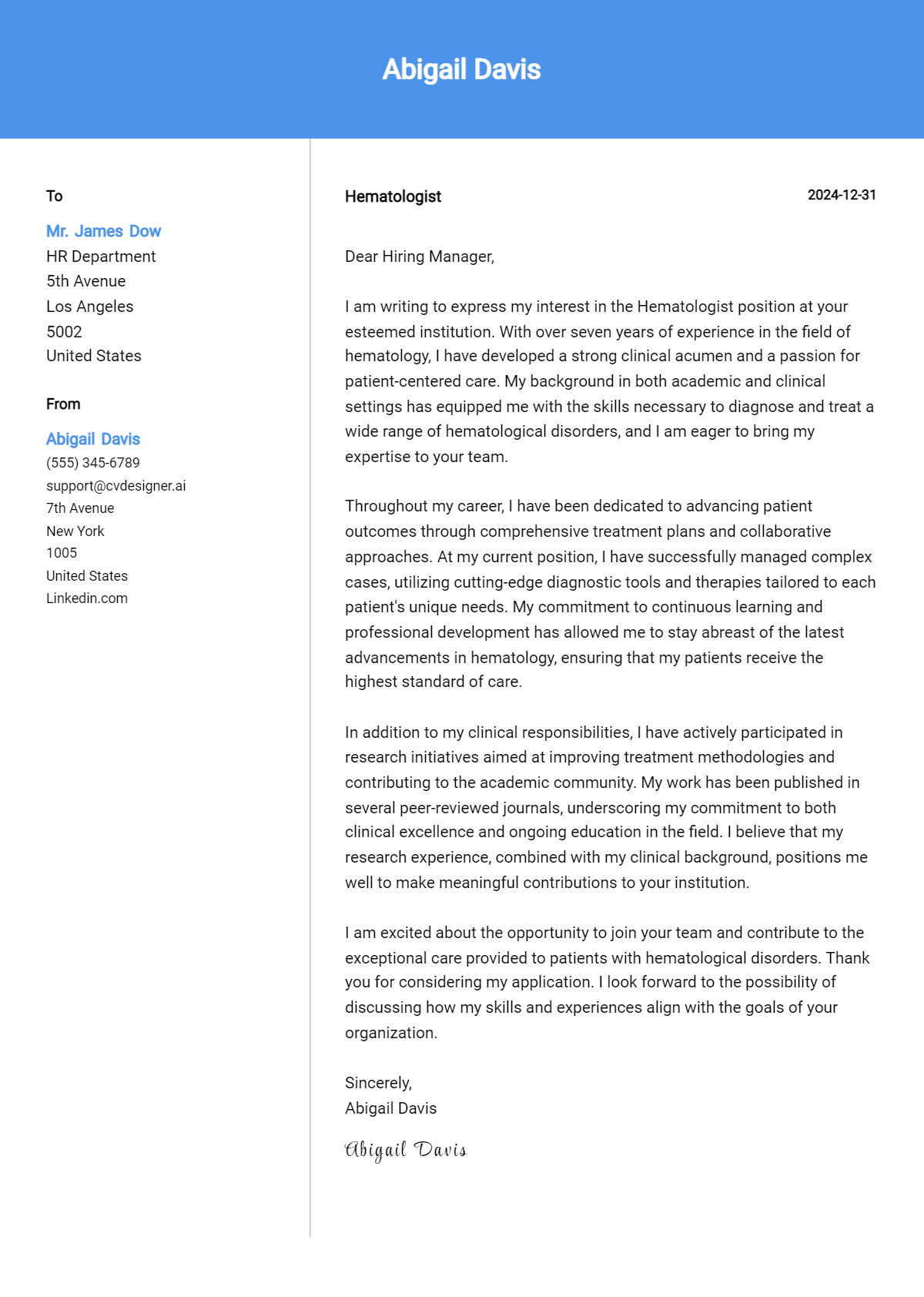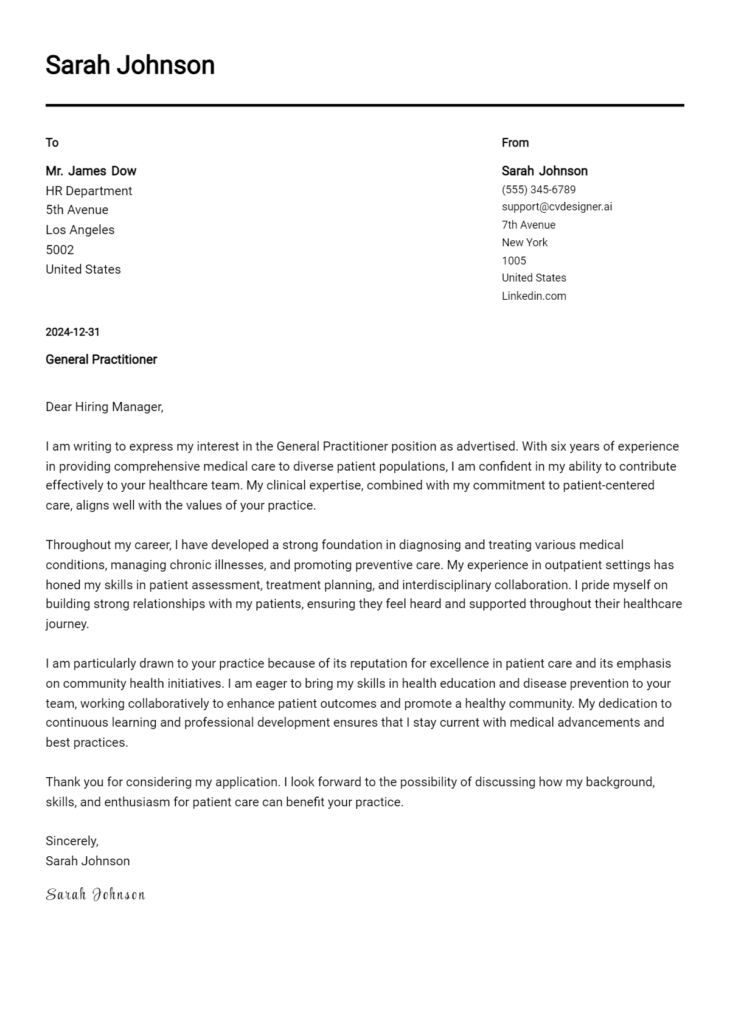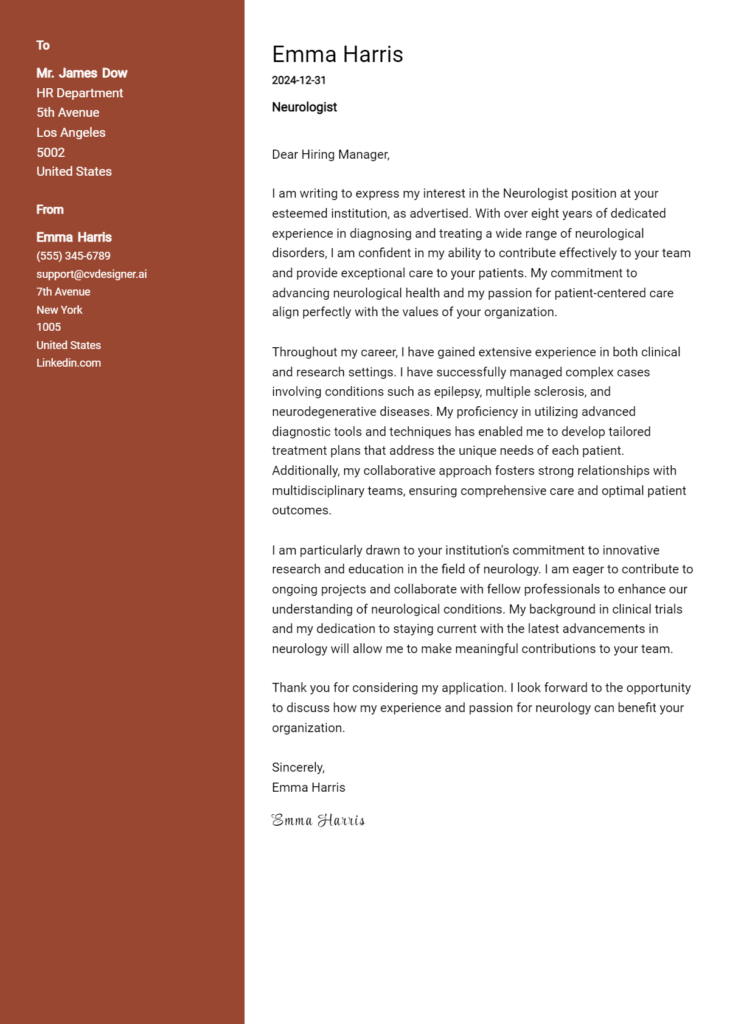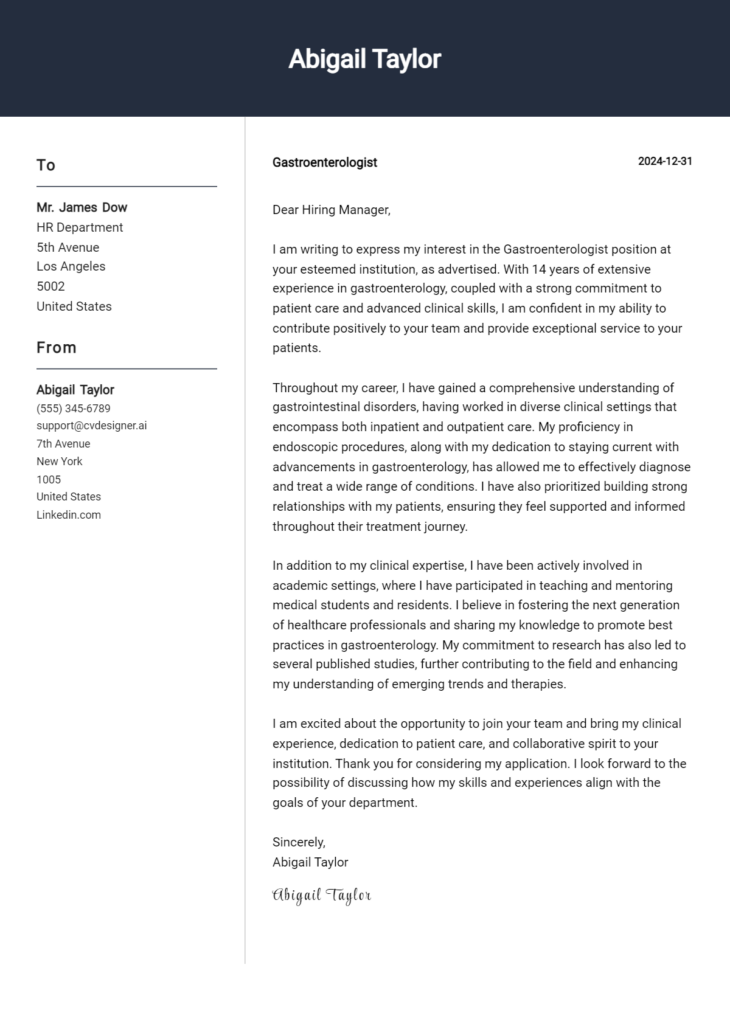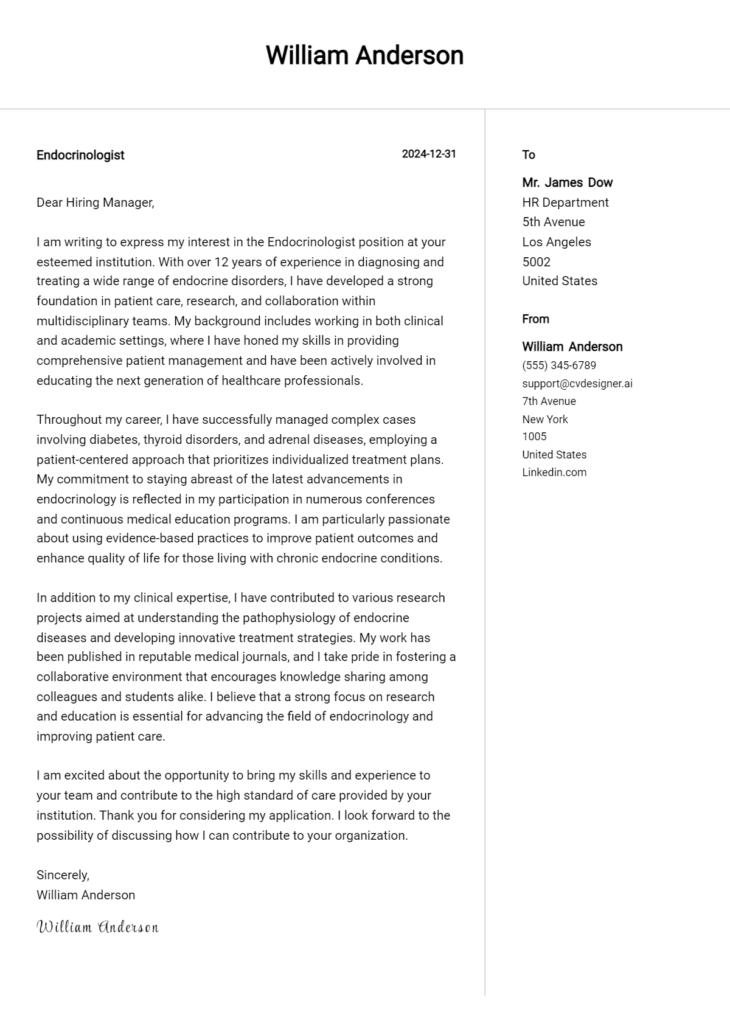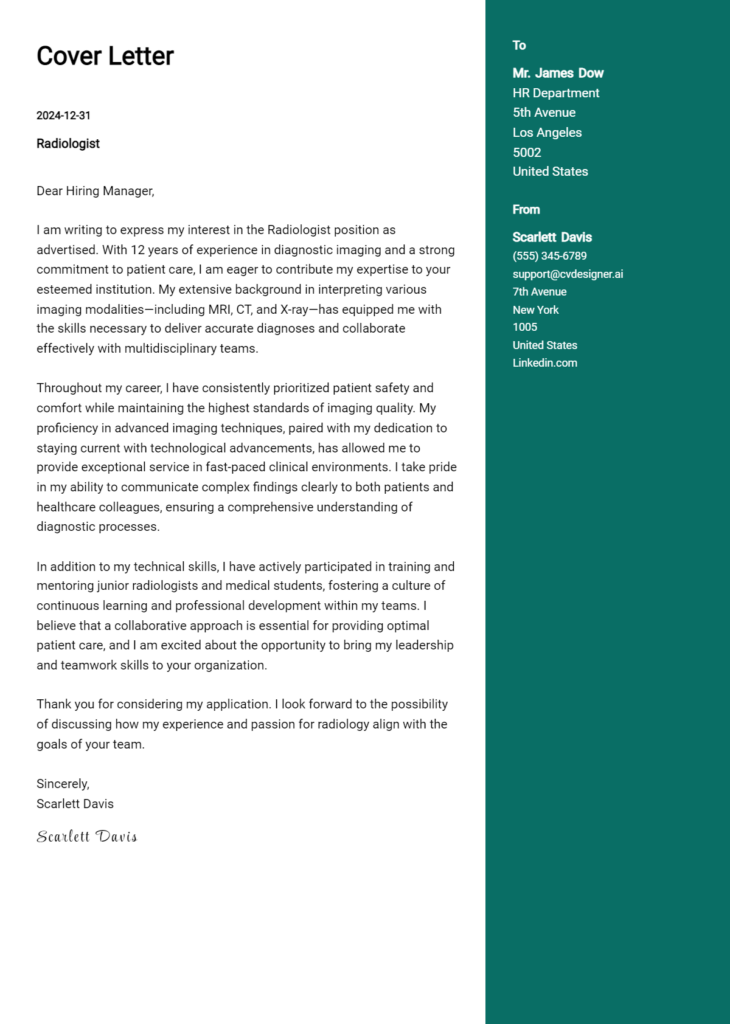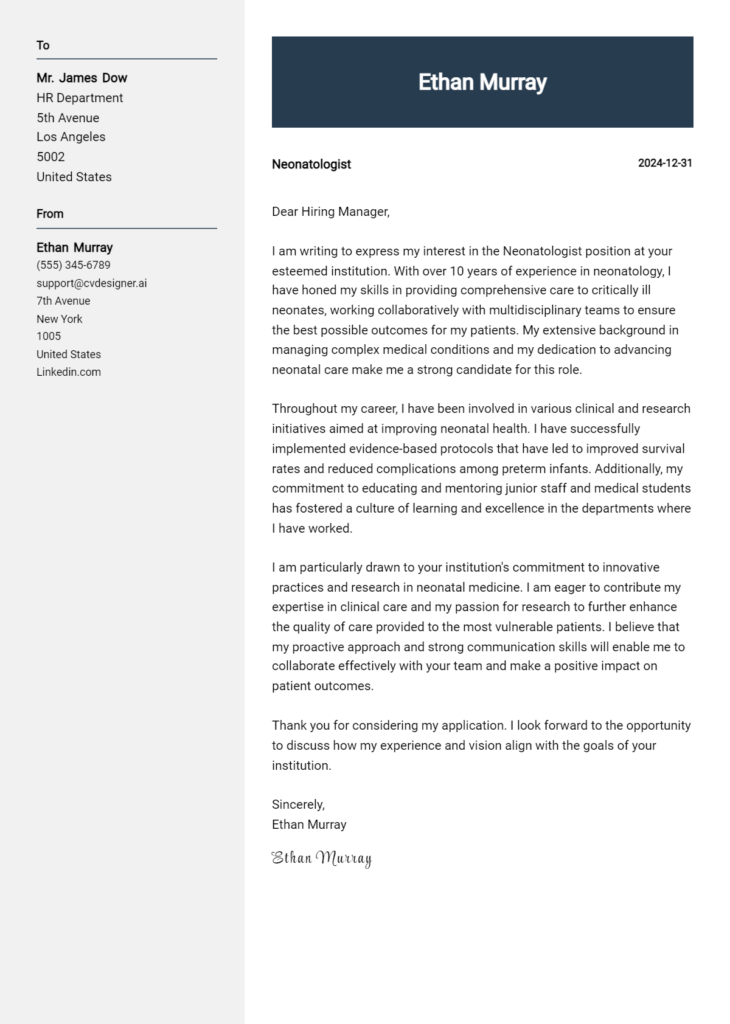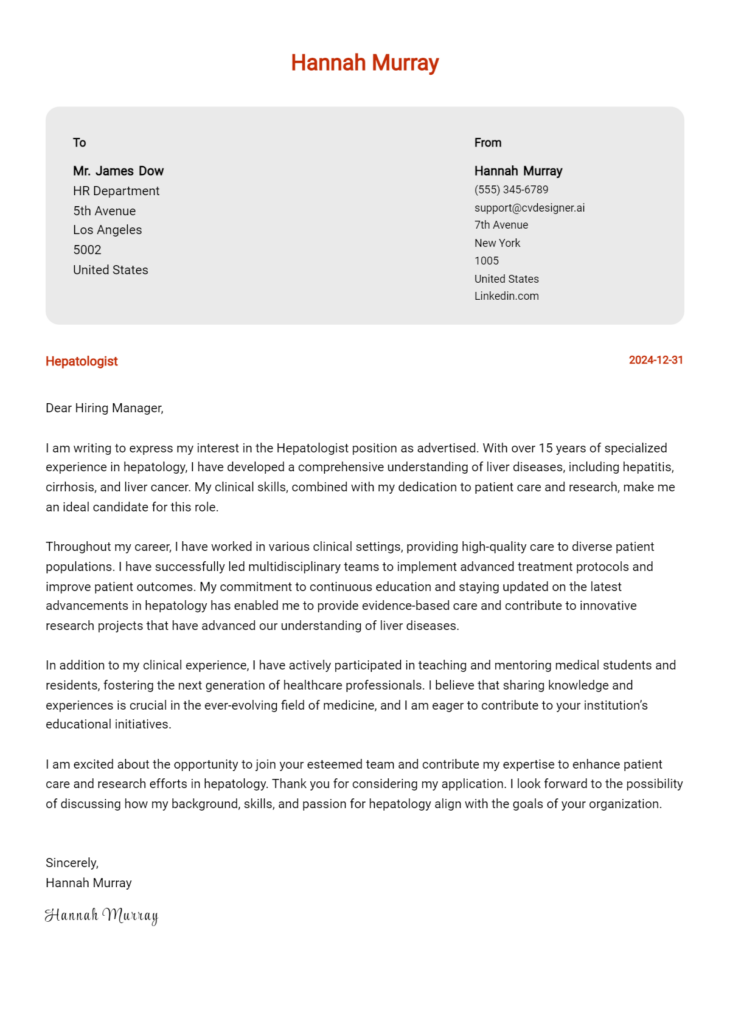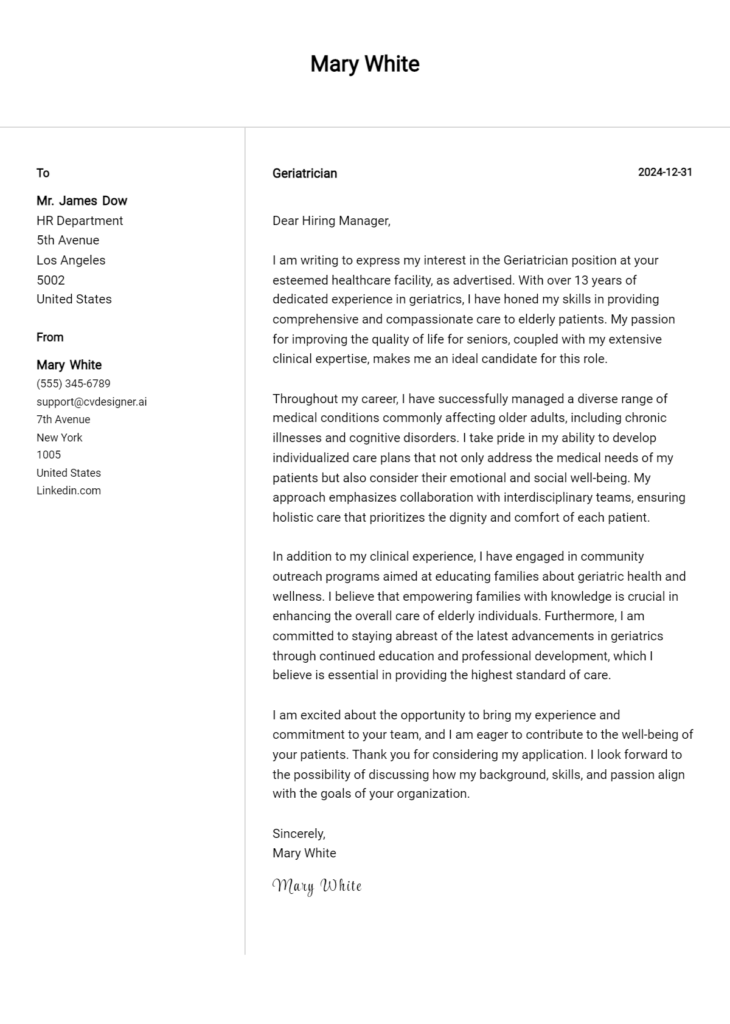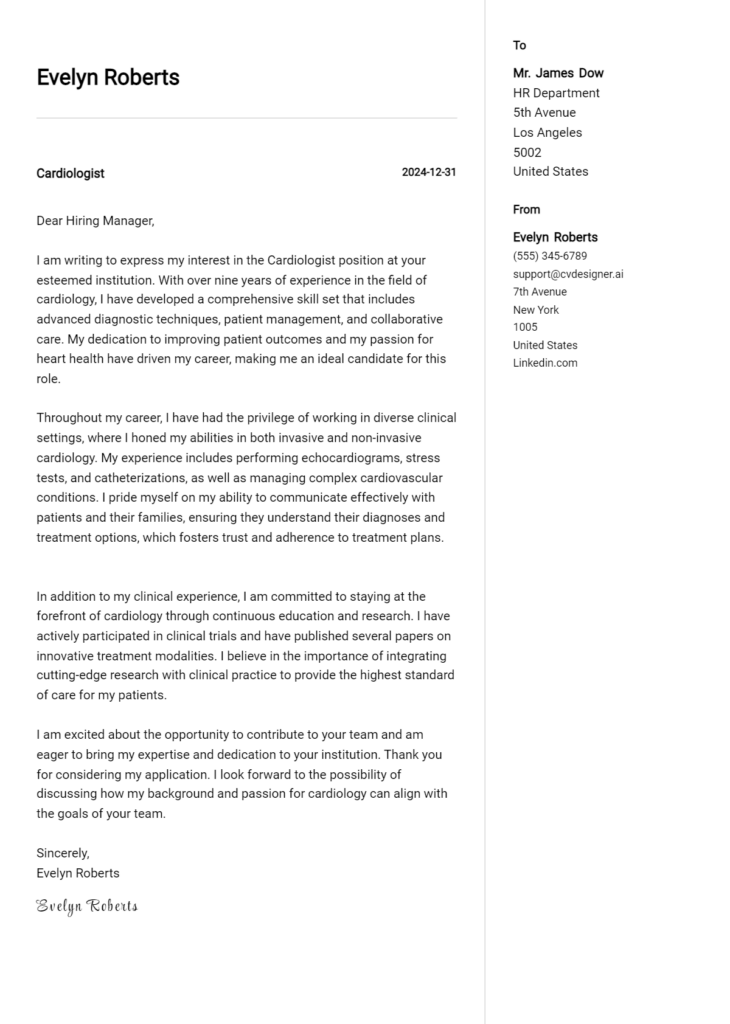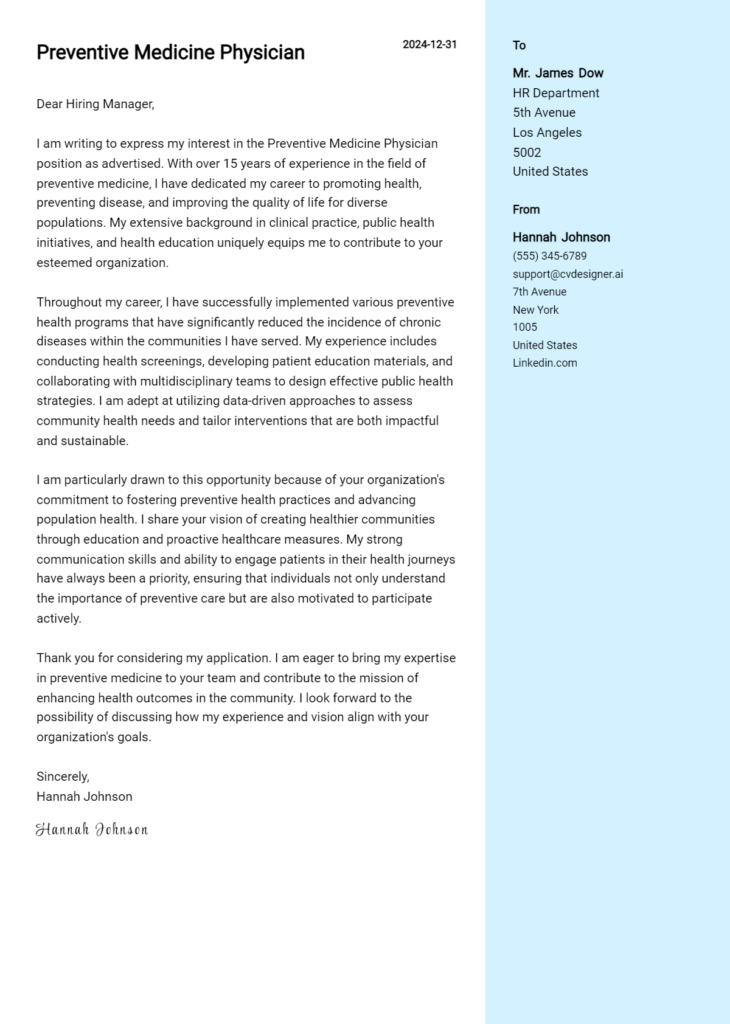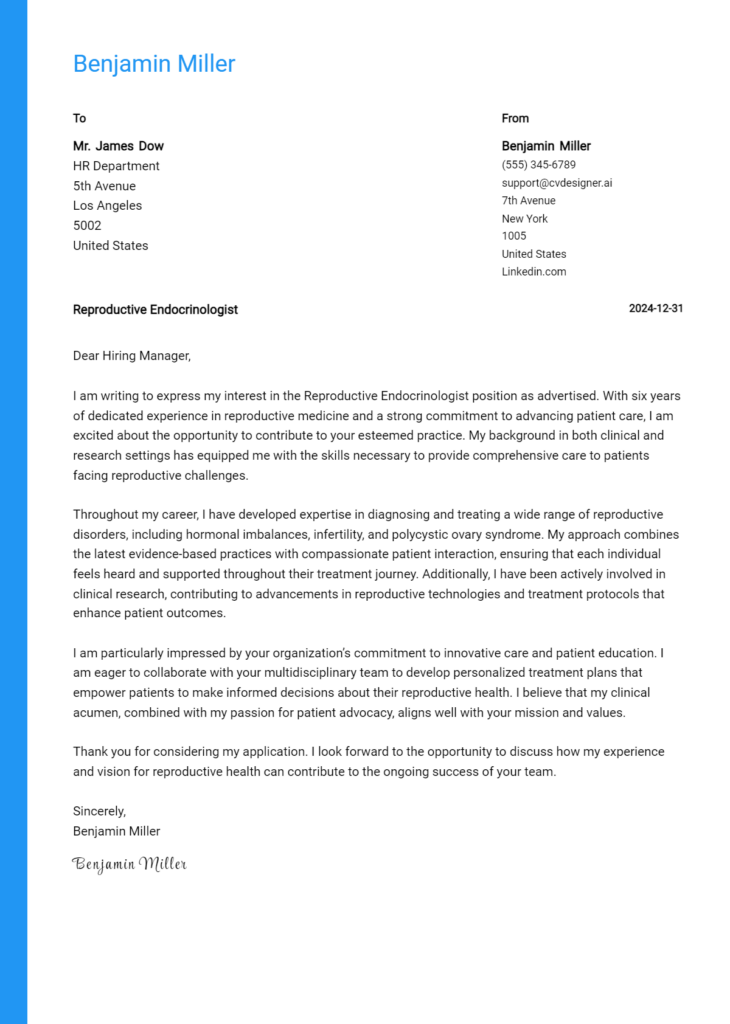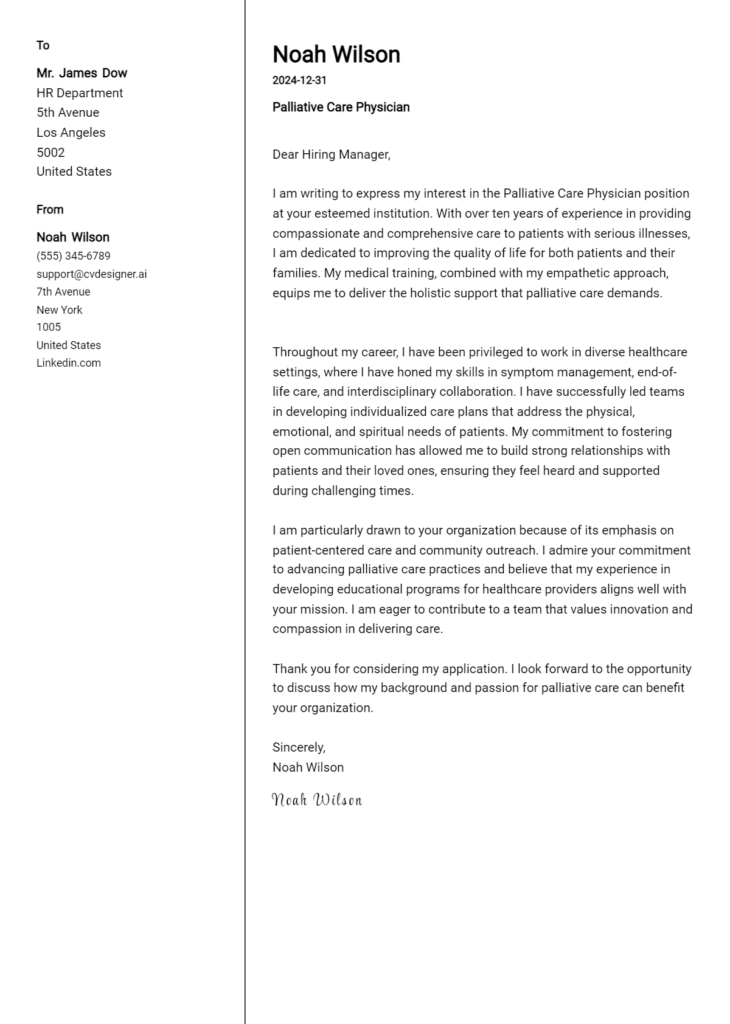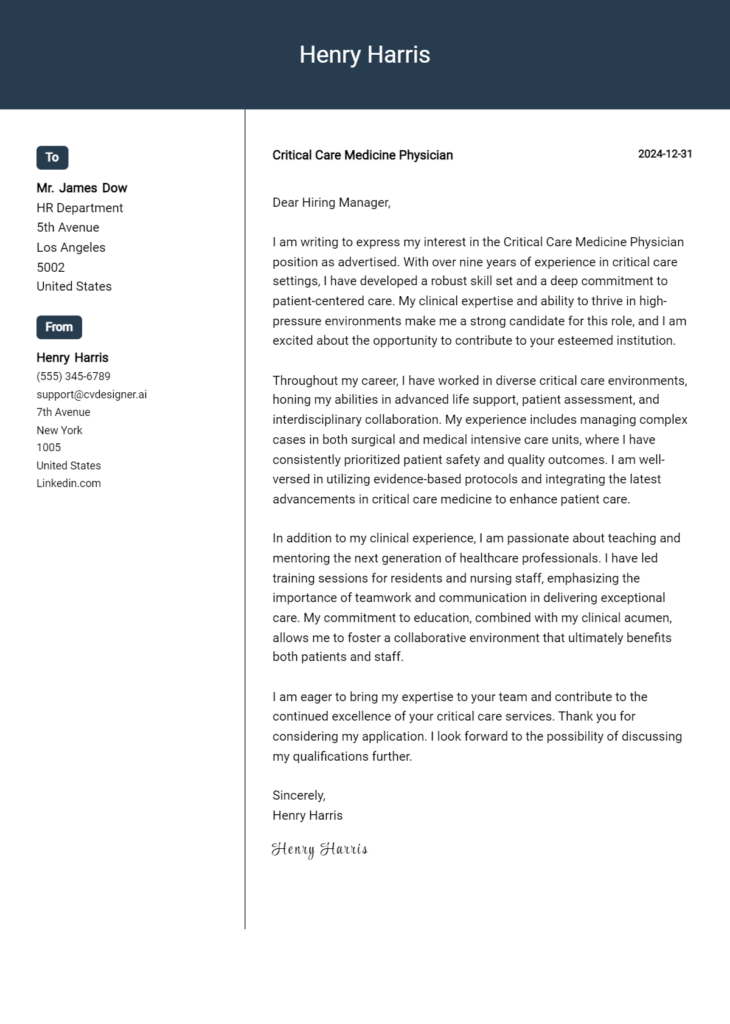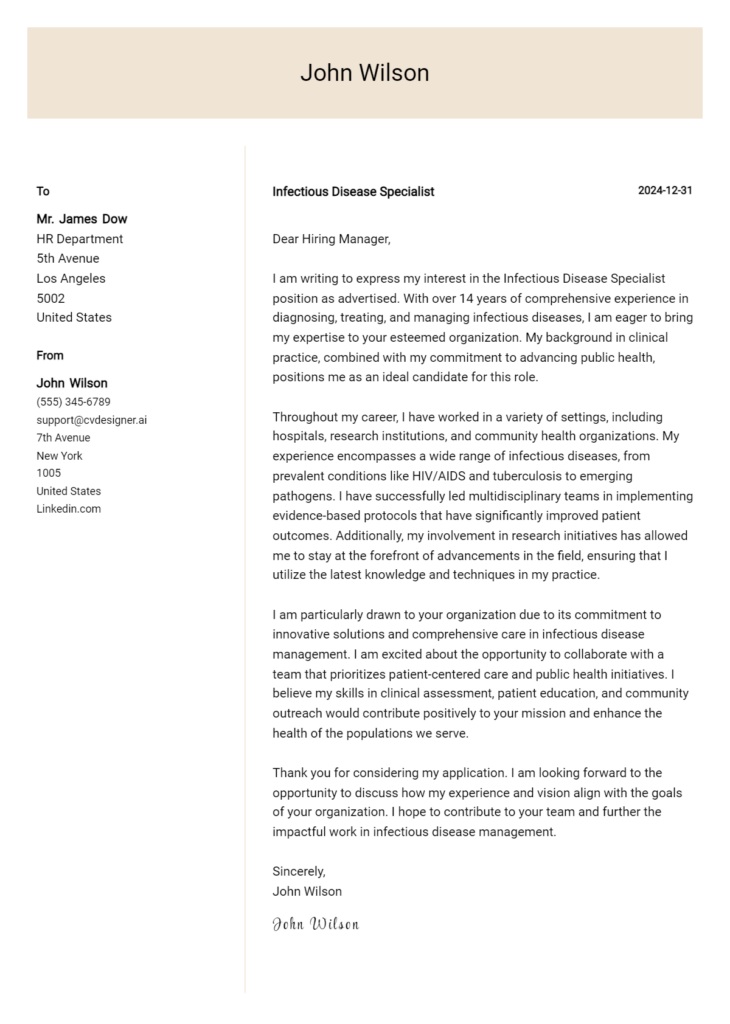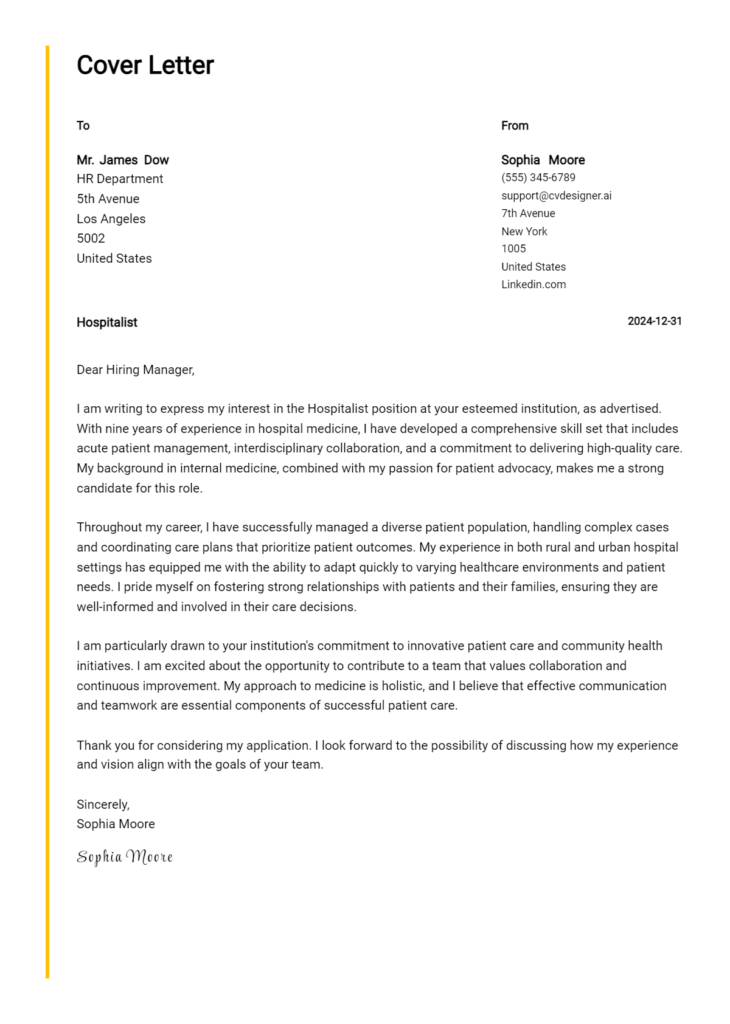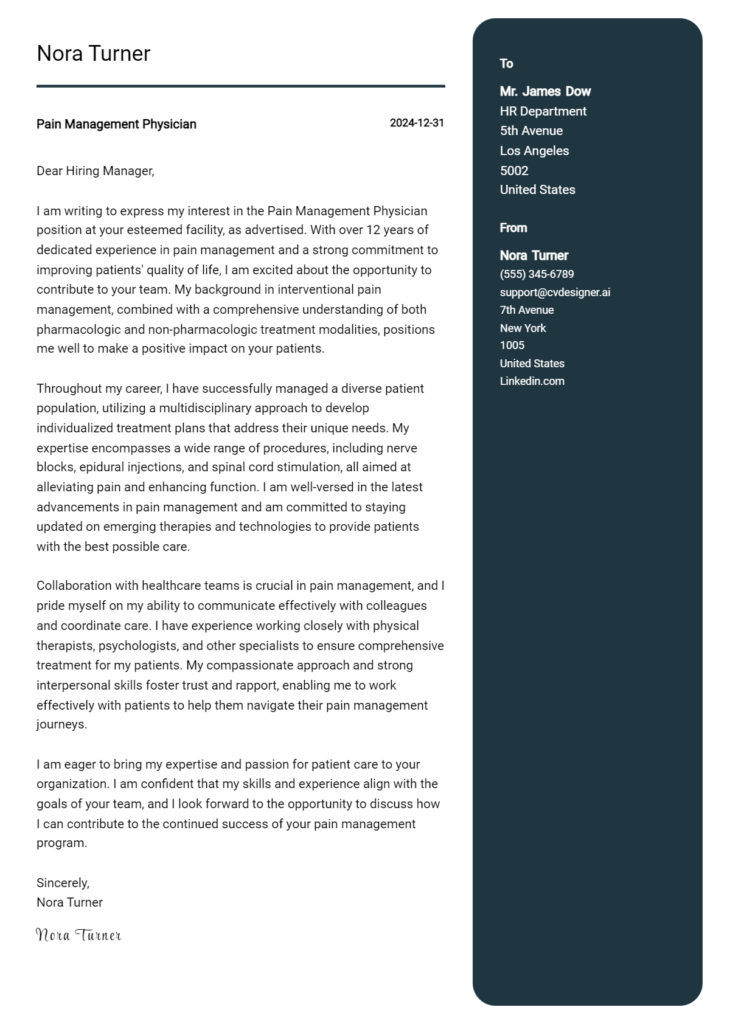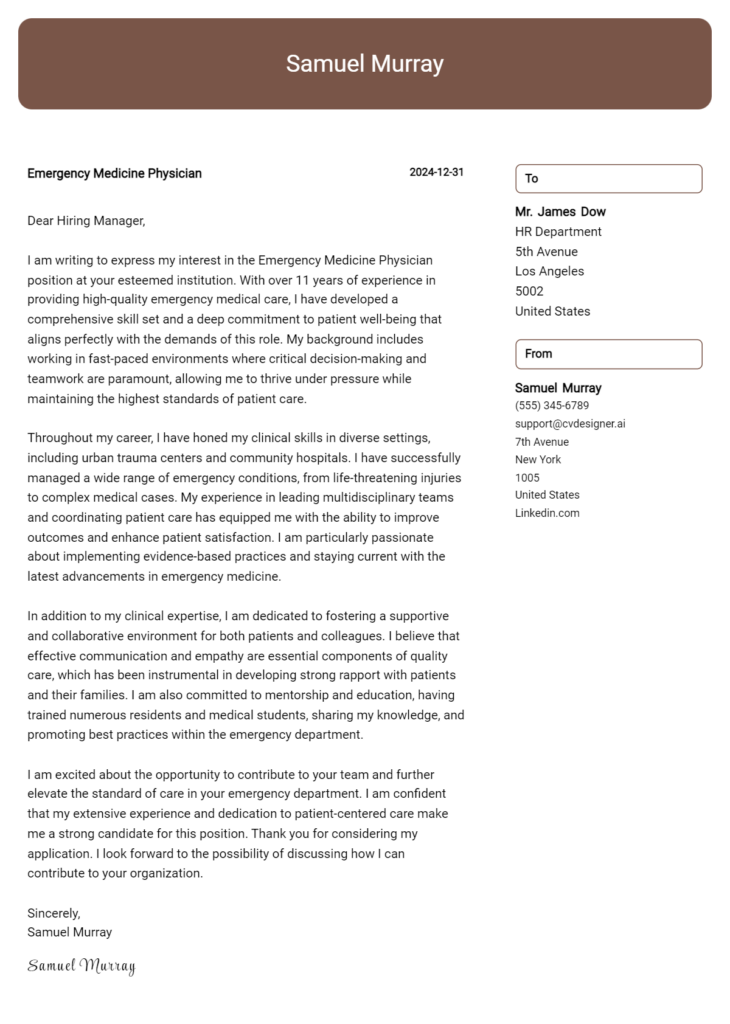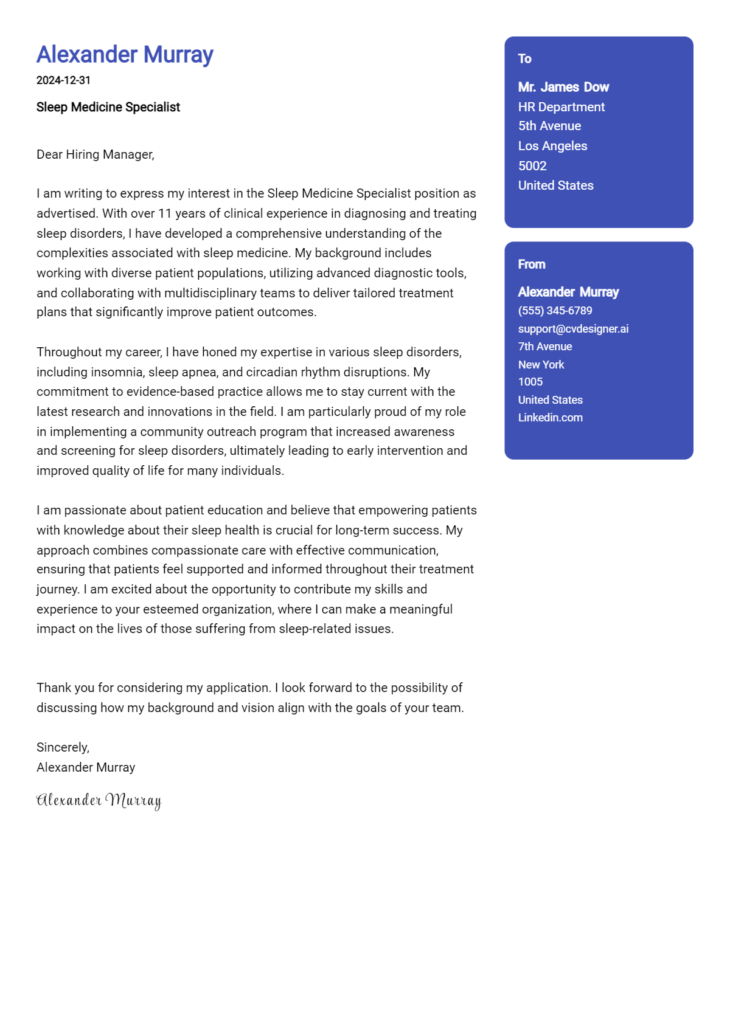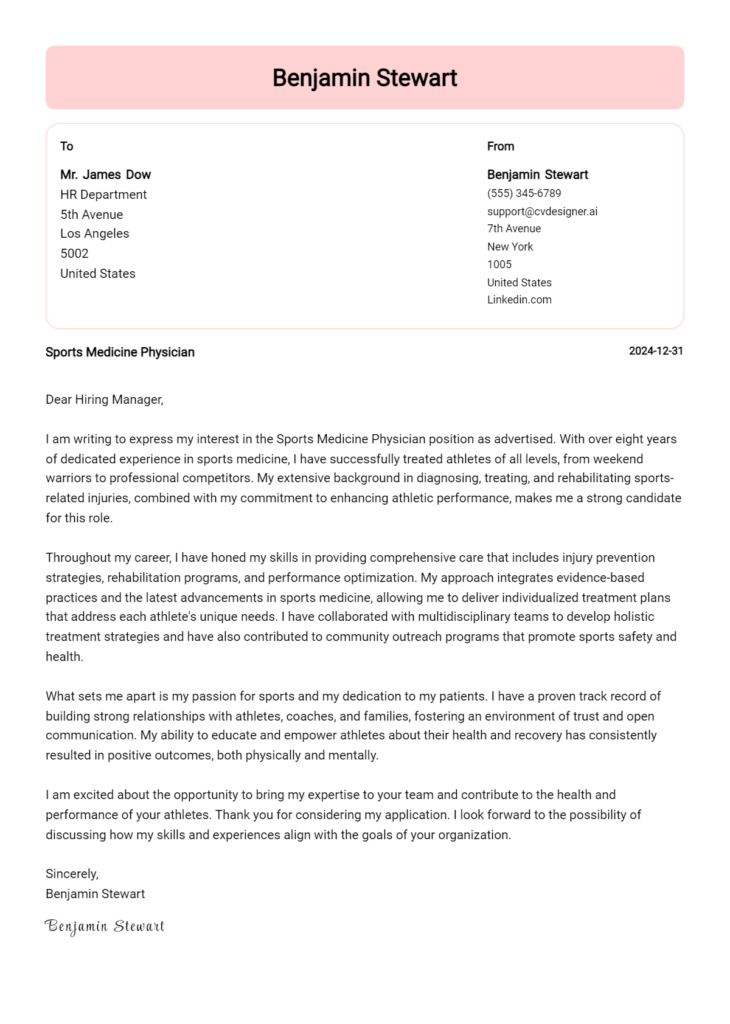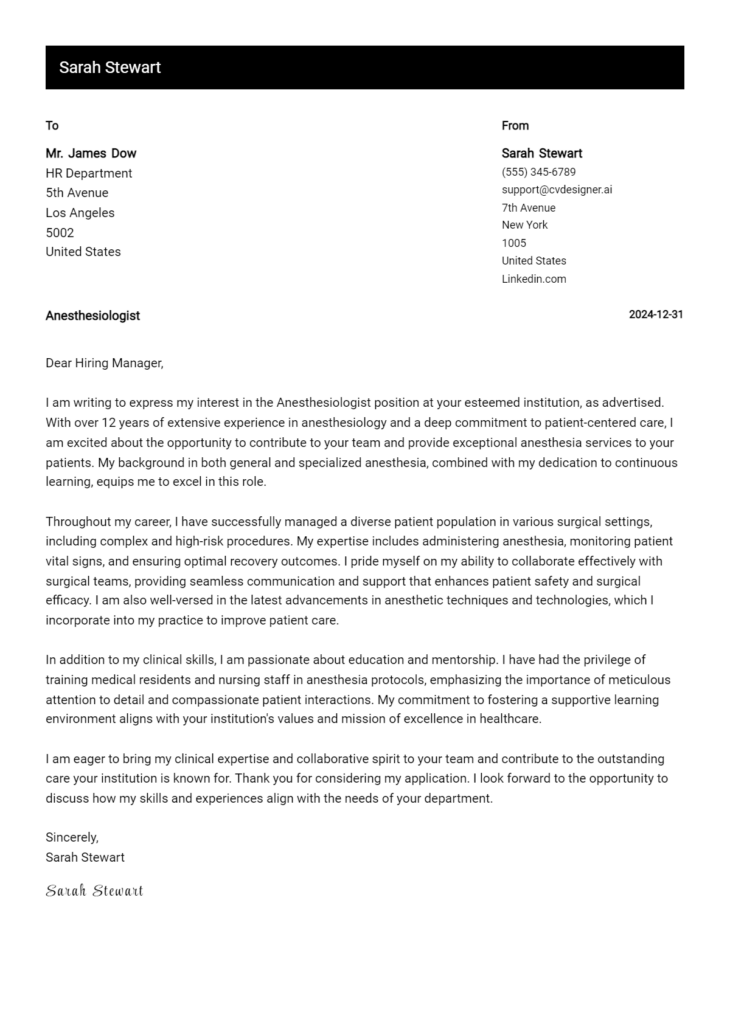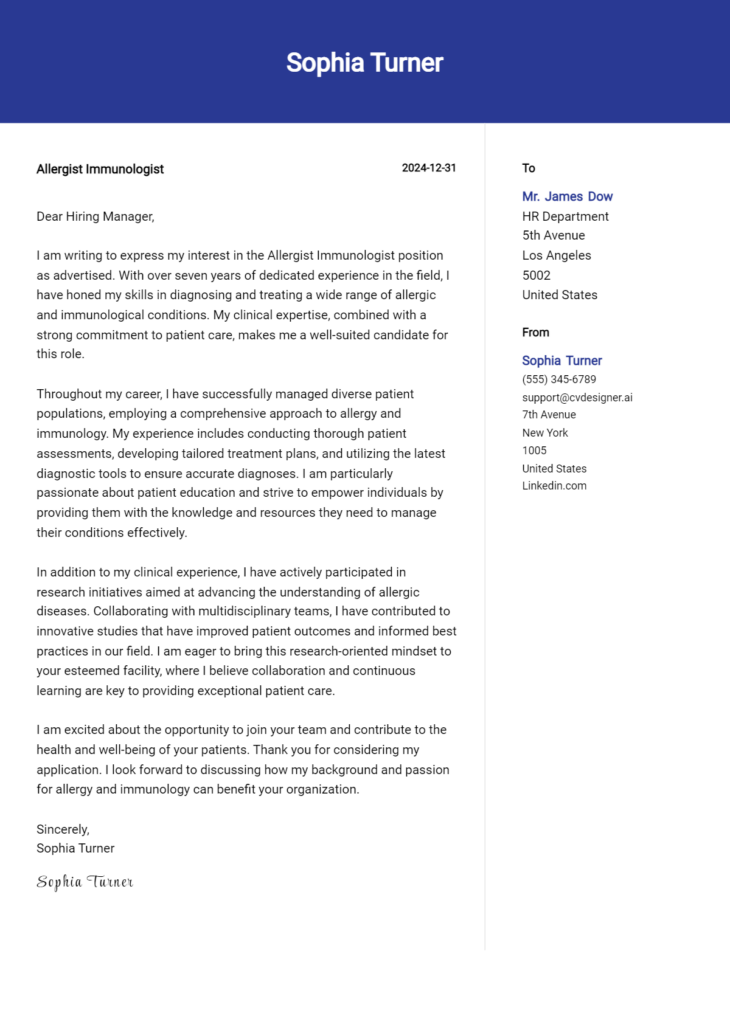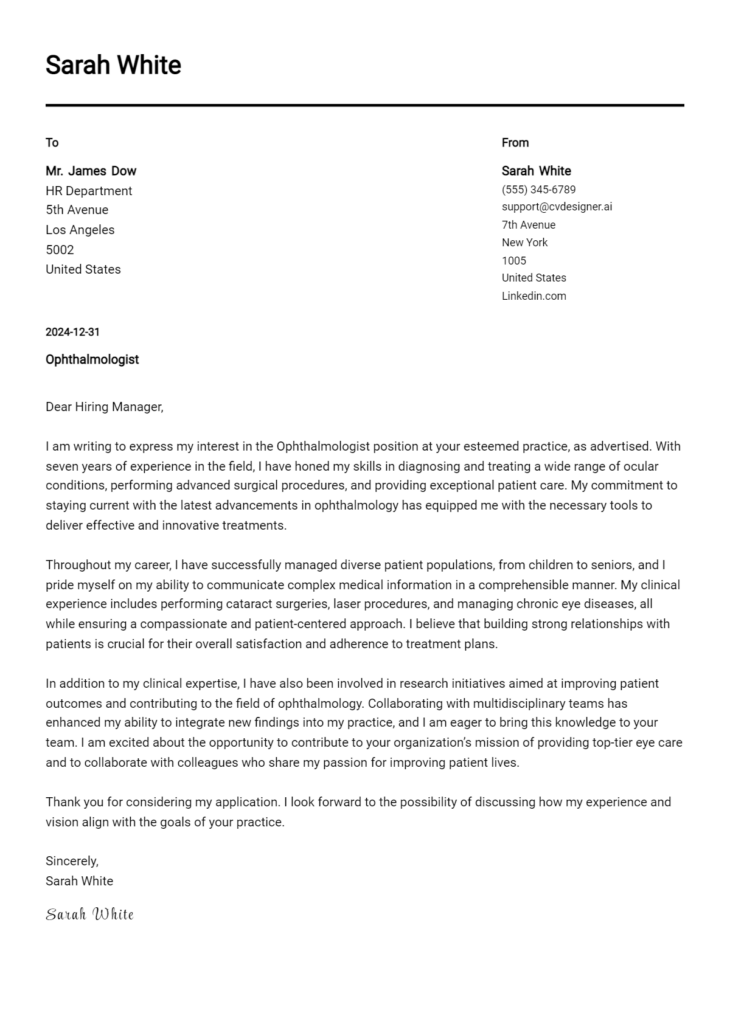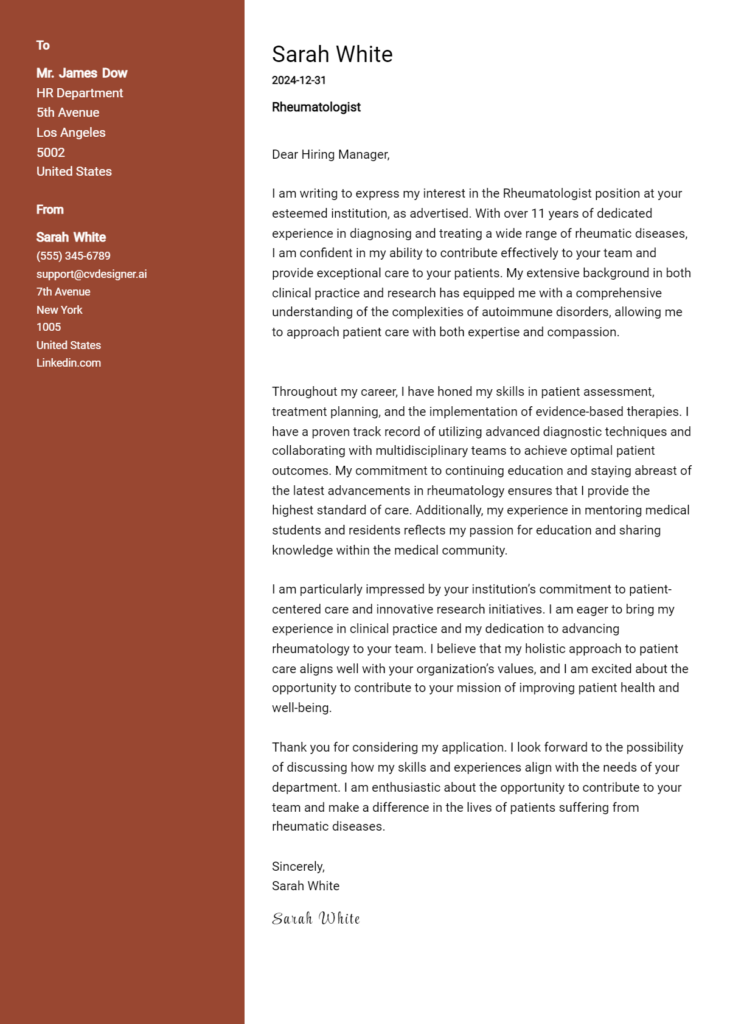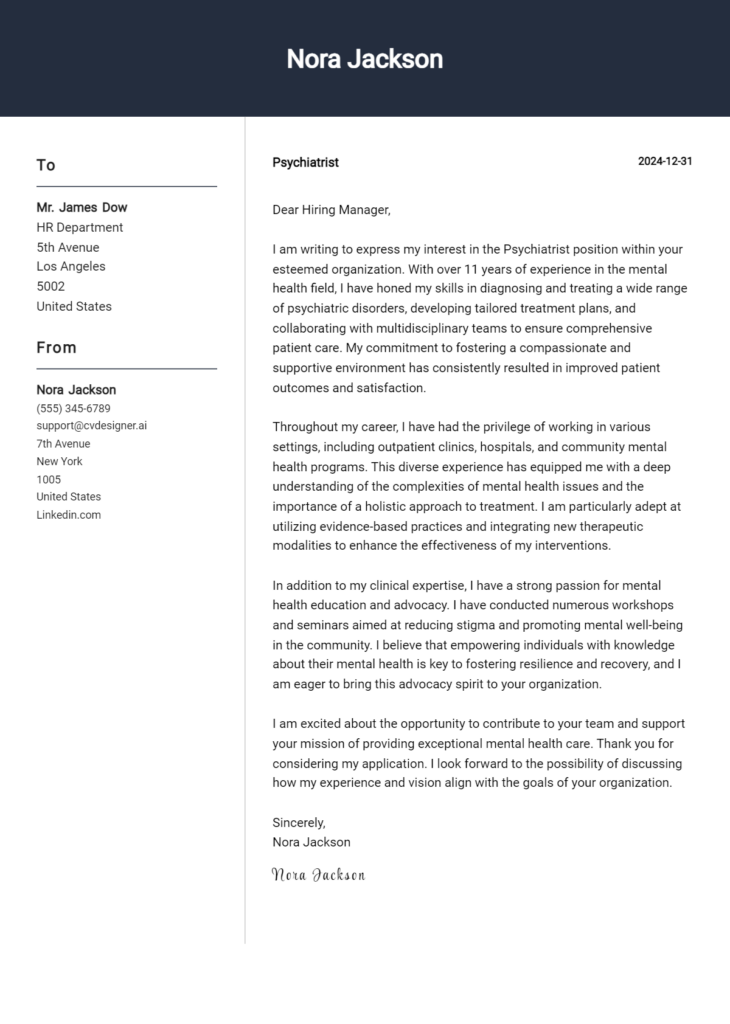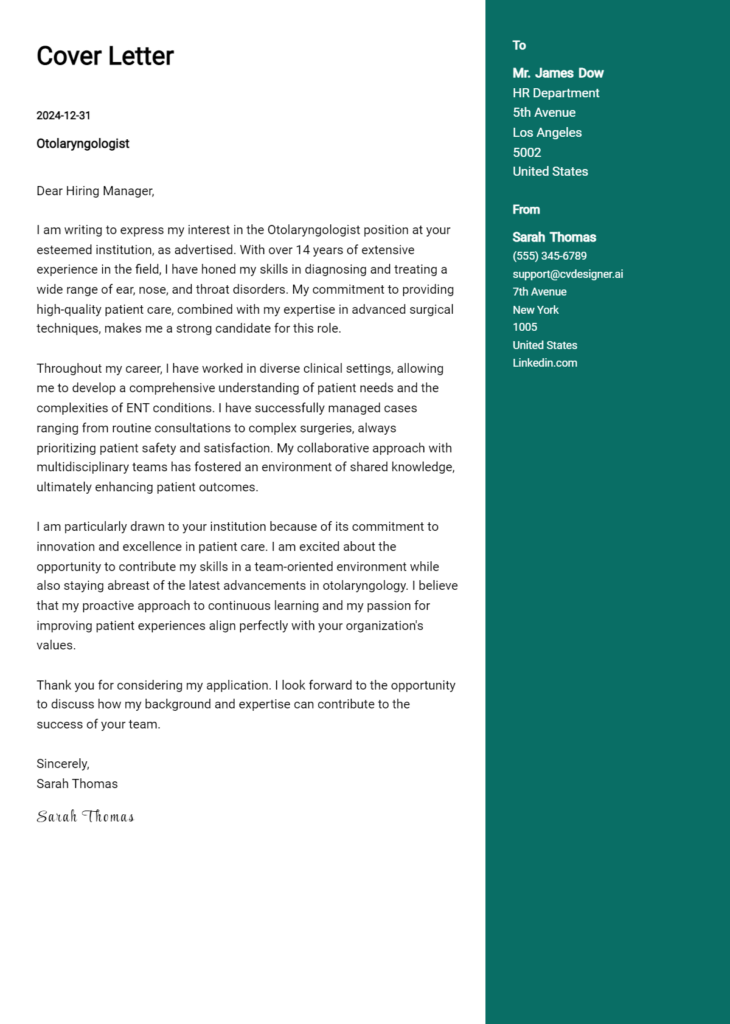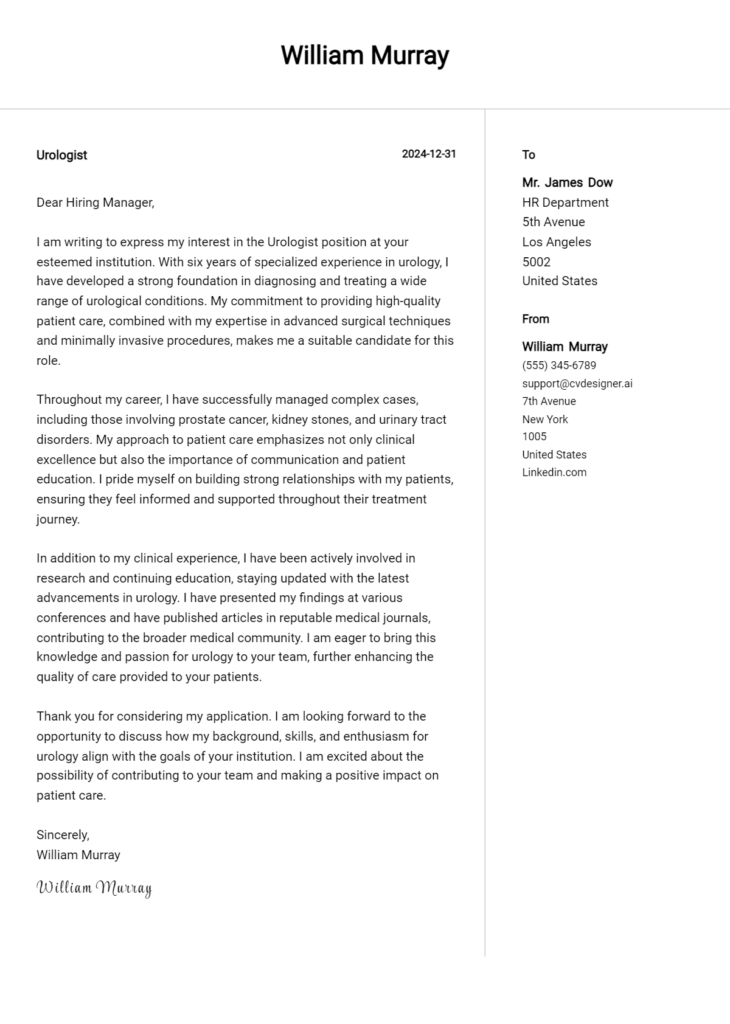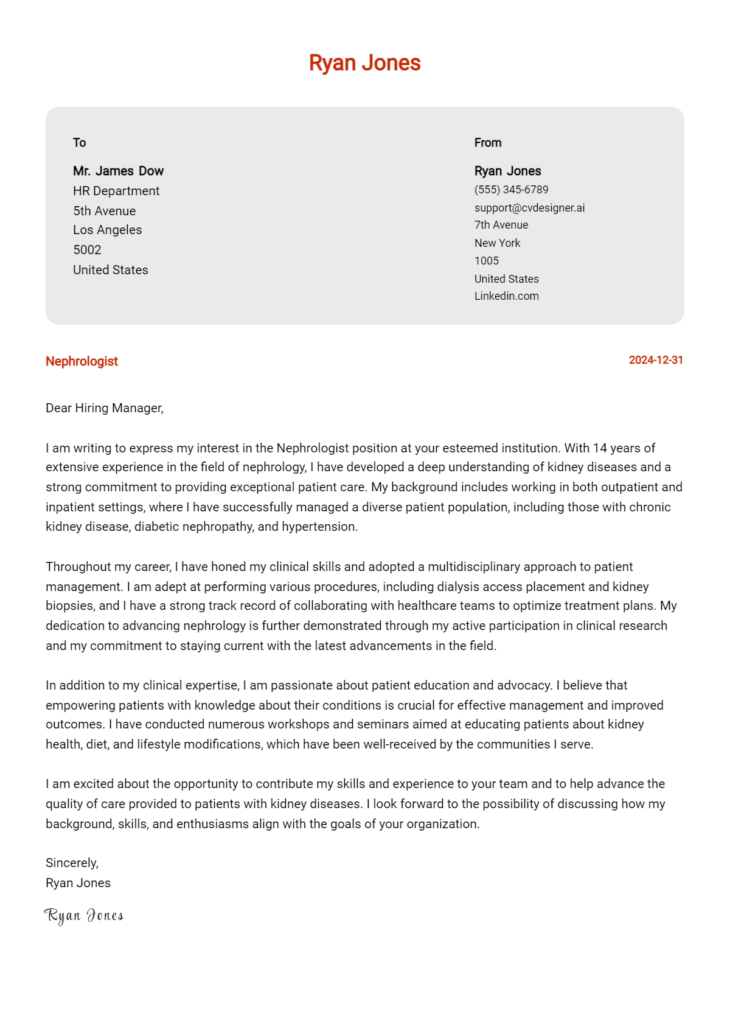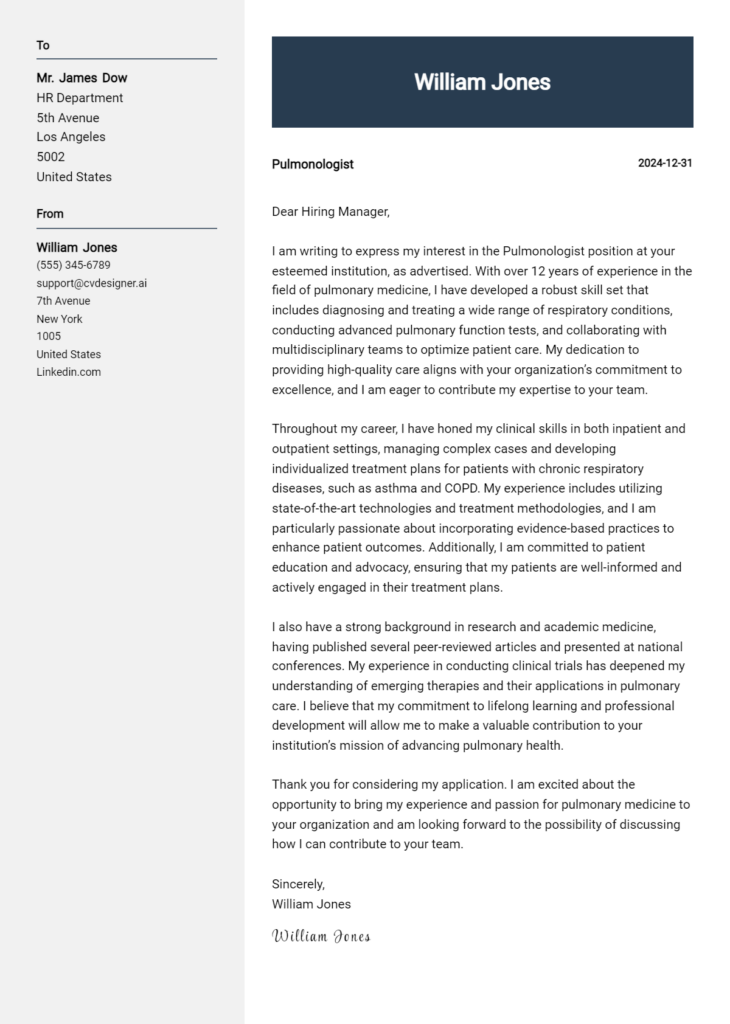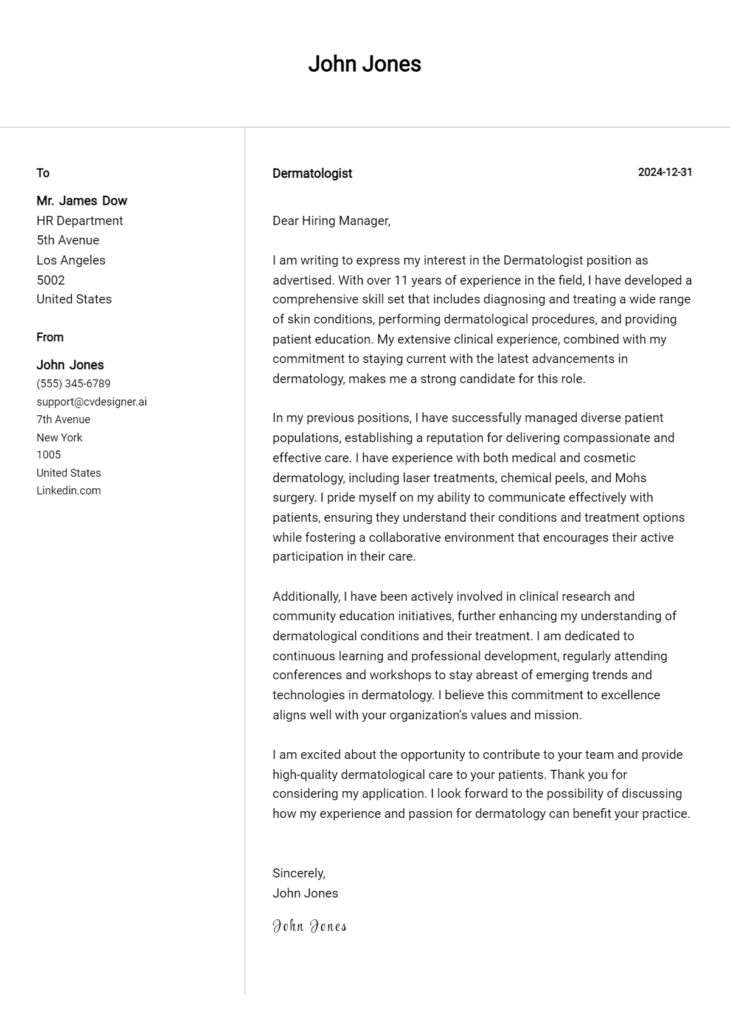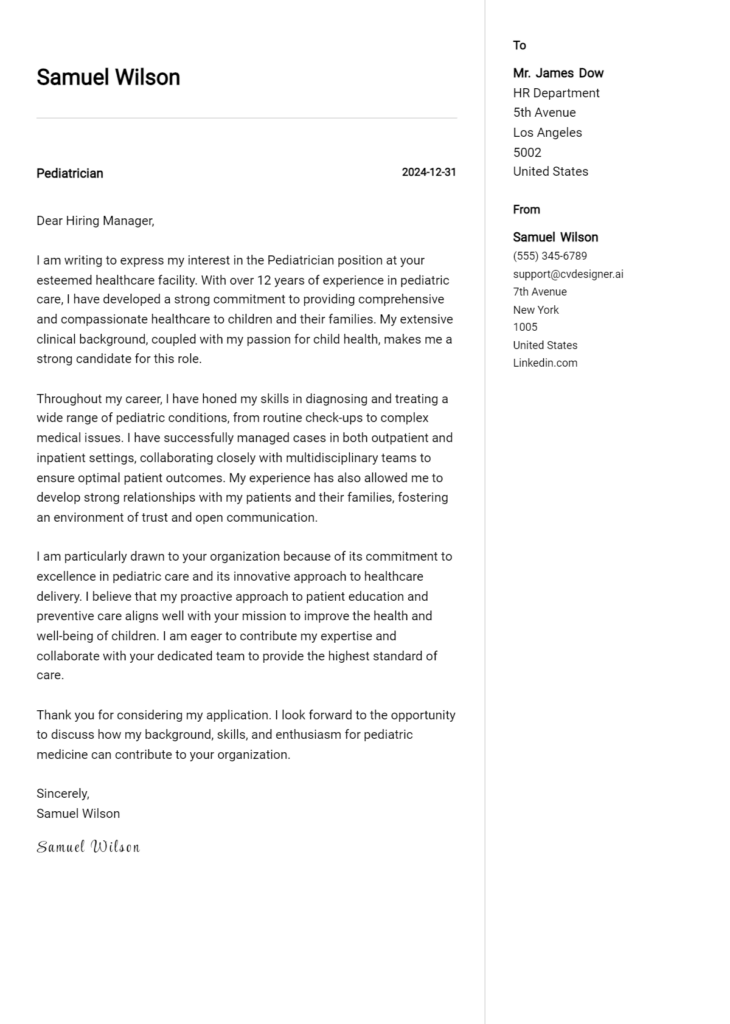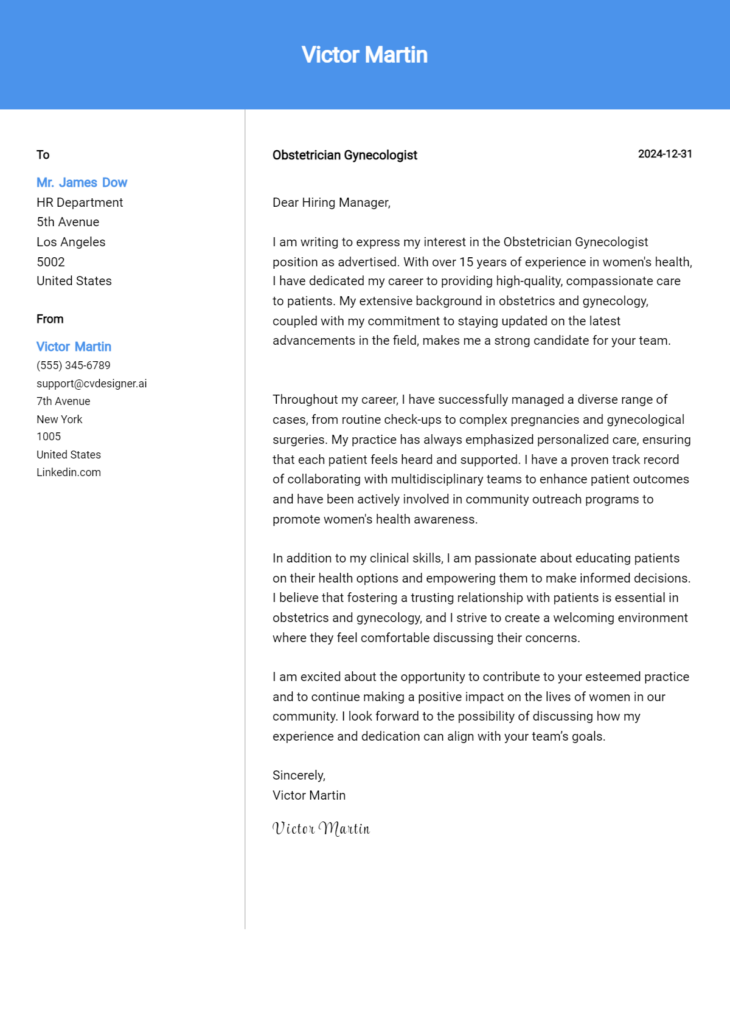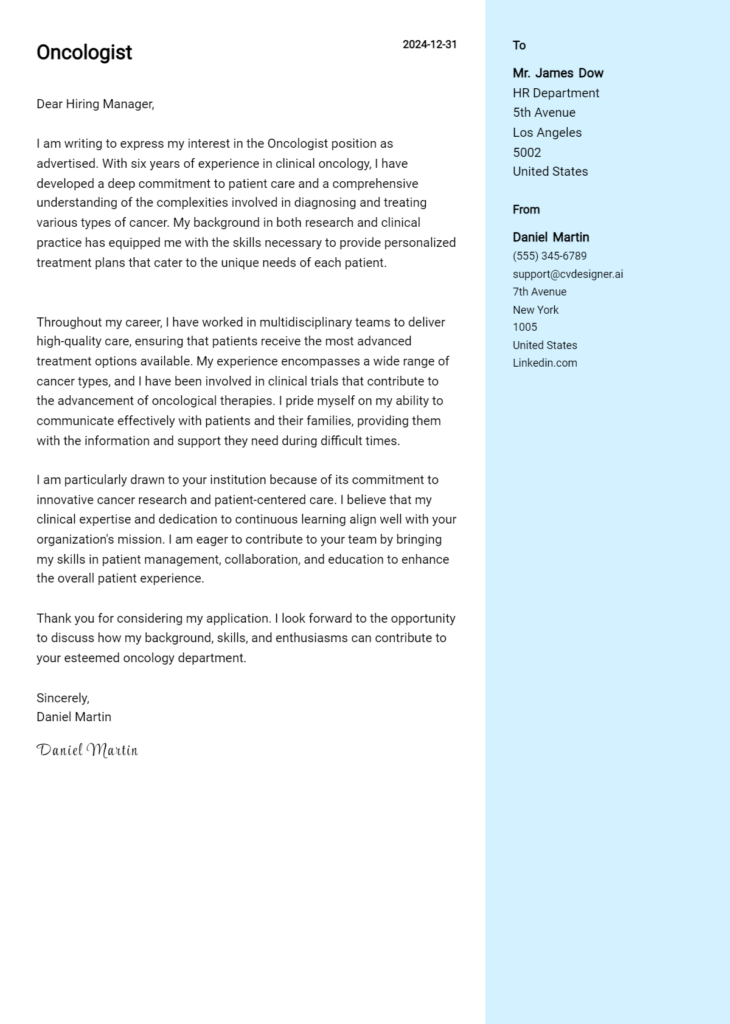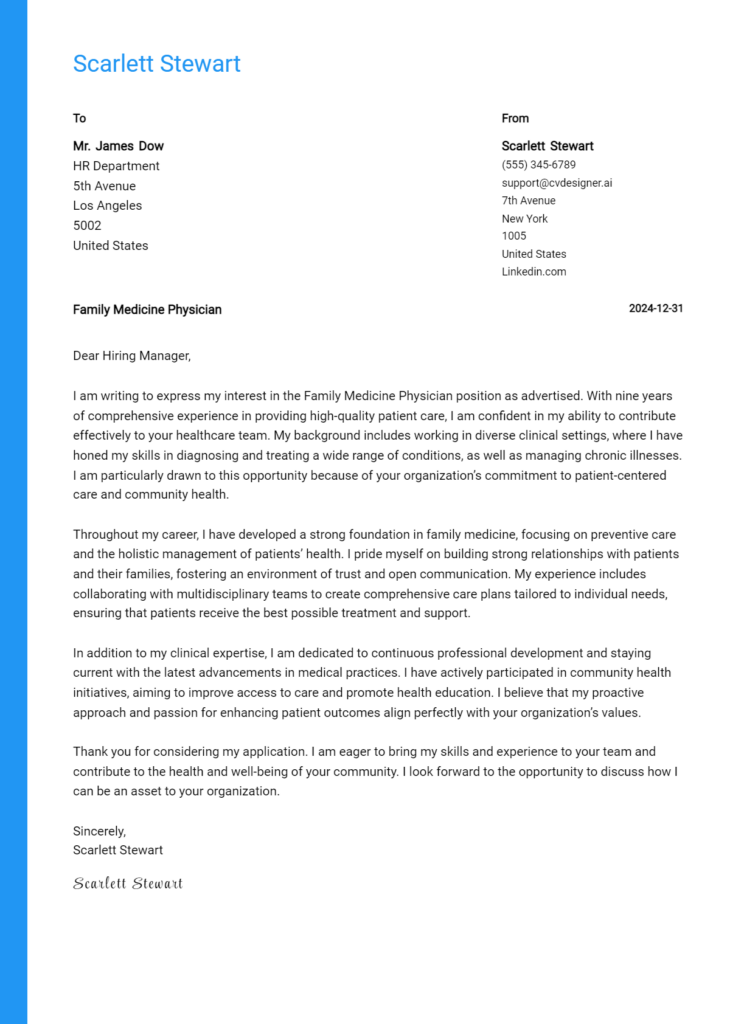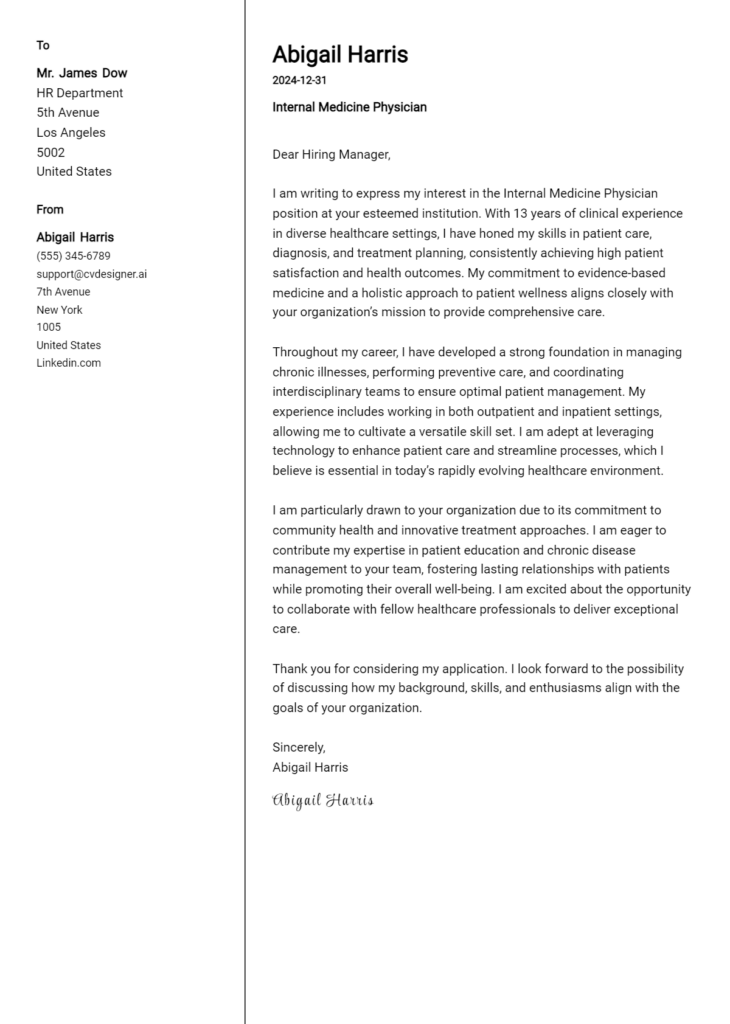Hematologist Cover Letter Examples
Explore additional Hematologist cover letter samples and guides and see what works for your level of experience or role.
How to Format a Hematologist Cover Letter?
Crafting a compelling cover letter is essential for hematologists as it serves as your first impression to potential employers. The way you format your cover letter not only reflects your medical expertise but also demonstrates your commitment to patient care and attention to detail—qualities that are indispensable in the medical field. A well-structured cover letter can effectively convey your passion for hematology, your clinical skills, and your ability to contribute to a healthcare team.
In this guide, we will explore how to format your hematologist cover letter, focusing on the key components you should include to create a persuasive document.
We will cover the essential elements of a professional cover letter, such as:
- Cover Letter Header
- Cover Letter Greeting
- Cover Letter Introduction
- Cover Letter Body
- Cover Letter Closing
Each section is crucial in showcasing your qualifications and professionalism. Let’s delve into each component to help you craft a standout hematologist cover letter.
Importance of the Cover Letter Header for a Hematologist
The header of a cover letter is a critical component that sets the tone for your application. It provides essential contact information and establishes a professional first impression. For a Hematologist, clarity and professionalism are paramount, as they reflect your attention to detail and dedication to the field. A well-structured header should include your contact information, the date, and the recipient's details. This ensures that your application is easily identifiable and that the hiring manager can reach you without any hassle.
Strong Example
Dr. Jane Smith, MD 123 Hematology Lane Boston, MA 02115 jane.smith@email.com (555) 123-4567 October 10, 2023 Dr. John Doe Head of Hematology General Hospital 456 Medical Drive Boston, MA 02116
Weak Example
Jane Smith Hematologist jane.smith@email.com 10/10/23 To Whom It May Concern,
The Importance of a Strong Cover Letter Greeting for a Hematologist
The greeting of your cover letter is crucial as it sets the tone for the rest of your application. A well-crafted greeting not only demonstrates your professionalism but also shows that you have taken the time to personalize your communication. By addressing the hiring manager directly, you establish a connection and convey genuine interest in the position. To create an impactful greeting, avoid generic salutations like "To Whom It May Concern" and instead strive to research the recipient's name or title. This small effort can make a significant difference in how your application is received.
When drafting your greeting, consider the following tips:
- Always address the hiring manager by name if possible.
- If you cannot find a specific name, use a title along with the department (e.g., "Dear Director of Hematology").
- Avoid vague greetings that can come off as impersonal.
Here are examples of strong and weak greetings for a Hematologist cover letter:
Strong Greeting Example
Dear Dr. Smith,
Weak Greeting Example
To Whom It May Concern,
The Importance of a Well-Crafted Cover Letter Introduction for a Hematologist
A well-crafted cover letter introduction is crucial for a Hematologist, as it sets the tone for the rest of the application and serves as the candidate’s first impression. This introduction should not only capture the hiring manager's attention but also express genuine interest in the position. Additionally, it should succinctly highlight key skills or notable achievements that align with the specific requirements of the role. A strong introduction can make the difference between a candidate being remembered or overlooked in a competitive field.
Strong Example
Dear [Hiring Manager's Name], I am excited to apply for the Hematologist position at [Hospital/Clinic Name], as I am deeply passionate about advancing patient care in the field of hematology. With over 8 years of experience diagnosing and treating complex blood disorders, coupled with my recent research on novel therapies for leukemia, I am confident in my ability to contribute effectively to your esteemed team. My dedication to improving patient outcomes has been recognized through multiple awards, including the [Specific Award Name], which motivates me to continue pushing the boundaries of hematological science.
Weak Example
Hello, I would like to apply for the Hematologist job you have posted. I have some experience in the field and think it could be a good fit. I’ve worked in hospitals before, but I don’t have any specific achievements to mention. I hope you consider my application.
Purpose of the Cover Letter Body for a Hematologist
The cover letter body for a Hematologist serves as a crucial platform to articulate the candidate's unique qualifications, experiences, and the value they bring to the healthcare organization. This section allows the applicant to highlight specific projects, research, or clinical accomplishments that demonstrate their expertise in hematology, as well as their ability to contribute positively to patient care and team dynamics. By providing concrete examples of past successes, such as leading a clinical trial or implementing innovative treatment protocols, the candidate can effectively differentiate themselves from other applicants and illustrate their commitment to the field.
Strong Example
I have had the privilege of leading a multidisciplinary team in a groundbreaking clinical trial for a novel treatment for acute myeloid leukemia, which resulted in a 30% increase in patient response rates compared to standard therapies. This experience not only honed my leadership and collaboration skills but also reinforced my commitment to advancing hematological care through evidence-based practices. Additionally, my published research on the genetic markers of hemoglobinopathies has contributed to improved diagnostic protocols in our institution, showcasing my ability to integrate research with clinical practice effectively.
Weak Example
I have worked as a hematologist for several years and have seen many patients with blood disorders. I am good at my job and have attended some conferences. I believe I can help your hospital because I like working with patients and solving problems.
The Importance of a Strong Cover Letter Closing for a Hematologist
The closing paragraph of a cover letter is crucial as it provides a final opportunity to summarize your qualifications, reiterate your enthusiasm for the position, and prompt the employer to take the next steps, such as reviewing your resume or scheduling an interview. A strong closing leaves a lasting impression and reinforces your suitability for the role, while a weak closing can diminish the impact of your entire application.
Strong Example
I am excited about the opportunity to contribute my expertise in hematology to your esteemed institution. With a robust background in both clinical practice and research, I am confident in my ability to provide exceptional patient care and advance the field. I look forward to the possibility of discussing my application further and would be thrilled to schedule an interview at your convenience. Thank you for considering my candidacy; I have attached my resume for your review.
Weak Example
Thank you for reading my letter. I think I could be a good fit for the job. Please look at my resume if you want. I hope to hear from you soon.
Crafting an effective cover letter is essential for candidates aspiring to secure a position as a Hematologist. This document serves as your first impression and should effectively convey your technical skills, problem-solving abilities, and collaborative nature, along with your commitment to continuous learning. By highlighting these attributes, you can demonstrate your qualifications and passion for the field. Here are some tips to help you create a compelling cover letter that stands out.
Tips for Writing a Hematologist Cover Letter
Showcase Your Technical Skills
Highlight your proficiency in hematological techniques and technologies, such as flow cytometry, bone marrow biopsies, or laboratory diagnostics. Be specific about your experiences and the impact of your skills in previous roles. This clarity not only demonstrates your expertise but also reassures employers that you are adept in essential procedures.Demonstrate Problem-Solving Abilities
Share examples of how you've tackled complex cases or challenges in your previous work. This could involve innovative treatment approaches or successful collaborations with multidisciplinary teams. Use quantifiable outcomes whenever possible to illustrate how your problem-solving strategies led to improved patient care.Emphasize Your Knowledge of the SDLC
Discuss your understanding of the Software Development Life Cycle (SDLC) as it pertains to healthcare data management systems. If you have experience with electronic health records (EHR) or health information systems, outline your role in implementing or optimizing these systems. This showcases your ability to integrate technology into patient care effectively.Highlight Teamwork and Collaboration
Hematologists often work within multidisciplinary teams. Illustrate your experience in collaborating with other healthcare professionals, such as oncologists, nurses, and lab technicians. Provide examples of how your teamwork has led to improved treatment plans or patient outcomes, emphasizing your ability to communicate and work harmoniously with others.Express a Passion for Continuous Learning
The field of hematology is constantly evolving, and your cover letter should reflect your commitment to staying updated with new research, treatments, and technologies. Mention any relevant continuing education courses, certifications, or professional memberships that demonstrate your dedication to professional growth. This not only shows your enthusiasm for the field but also highlights your readiness to adapt to new advancements.
By following these tips, you can enhance your cover letter and increase your chances of landing an interview. For additional assistance, consider utilizing cover letter templates or a cover letter builder to streamline your writing process.
Common Mistakes to Avoid in a Hematologist Cover Letter
Crafting a compelling cover letter is essential for standing out in the competitive field of hematology. Avoiding common mistakes can significantly enhance your chances of making a positive impression on hiring managers. Here are some pitfalls to watch out for:
Generic Content: Using a one-size-fits-all approach can make your cover letter forgettable. Tailor your letter to the specific position and institution by mentioning their values and how your expertise aligns with them.
Neglecting Format: An unorganized or poorly formatted cover letter can detract from your professionalism. Adhere to a clear cover letter format to ensure readability and presentability.
Spelling and Grammar Errors: Simple mistakes can undermine your credibility. Always proofread your letter, or consider using tools to check for errors before submission.
Lack of Specific Examples: Failing to provide concrete examples of your experience and achievements can weaken your case. Use specific instances to highlight your skills and contributions, particularly those relevant to hematology.
Overly Technical Language: While it’s important to convey your expertise, using excessive jargon can alienate the reader. Aim for clarity and conciseness to ensure your message resonates.
Ignoring the Job Description: Not addressing the requirements and responsibilities listed in the job description can signal a lack of interest. Make sure to align your skills with what the employer is seeking.
Missing a Call to Action: Concluding your letter without a strong call to action may leave the reader unsure of your intentions. Express your eagerness for an interview and suggest a follow-up.
By steering clear of these common mistakes, you can create a powerful cover letter that effectively showcases your qualifications as a hematologist. For further inspiration, check out these cover letter examples.
Cover Letter FAQs for Hematologist
What should I include in my cover letter as a Hematologist?
In your cover letter, you should highlight your relevant experience in hematology, including specific training, certifications, and any fellowships. Mention your familiarity with various hematological disorders, treatment protocols, and diagnostic techniques. It's also important to discuss your patient care philosophy and any research or clinical trials you've been involved in. Tailor your letter to the specific position you’re applying for by addressing how your skills and experiences align with the organization's mission and values. Don't forget to include your contact information and express your enthusiasm for the role.
How can I demonstrate my passion for hematology in my cover letter?
To convey your passion for hematology, share personal anecdotes or experiences that inspired your interest in this specialty. Discuss any volunteer work, research projects, or advocacy efforts related to blood disorders that you’ve participated in. Highlight any contributions you've made to the field, such as published research or presentations at conferences. Emphasize your commitment to advancing hematological care through continuous learning and patient-centered practice. By illustrating your dedication and enthusiasm, you create a compelling narrative that resonates with potential employers.
Should I address any gaps in my employment in my cover letter?
Yes, it’s advisable to address any gaps in your employment within your cover letter. Be honest and straightforward about the reasons for these gaps, whether they were due to personal circumstances, further education, or other professional development opportunities. Frame your explanation positively, focusing on how you used that time productively, such as gaining additional skills or knowledge relevant to hematology. This approach can help mitigate any concerns employers might have and demonstrate your resilience and commitment to your career in the field.
How can I make my cover letter stand out among other Hematologist applicants?
To make your cover letter stand out, personalize it for the specific institution or practice you're applying to. Research the organization’s recent achievements, challenges, or initiatives in hematology and incorporate that information into your letter. Use a compelling opening statement that captures the reader’s attention, and follow it with a narrative that showcases your unique qualifications and experiences. Incorporate metrics or specific outcomes from your previous roles to demonstrate your impact. Lastly, ensure your writing is clear, concise, and free of errors, as professionalism in presentation reflects your attention to detail.
Build your Cover Letter in minutes
Use an AI-powered cover letter builder and have your letter done in 5 minutes. Just select your template and our software will guide you through the process.

